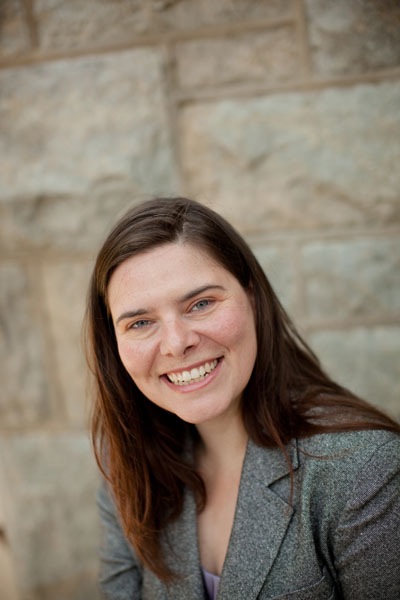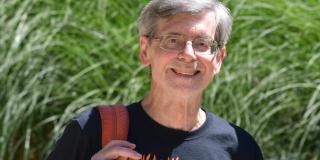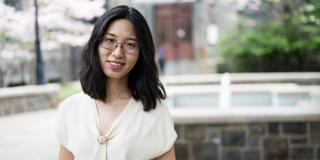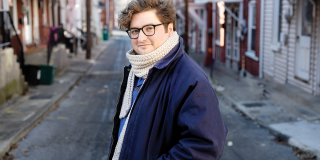Mary Foltz, associate professor of English and director of the South Side Initiative, has been awarded a Scholars and Society Fellowship by the American Council of Learned Societies (ACLS) to collaborate with regional LGBTQ organizations to build their archival collections and produce lectures, academic articles, and social media programming.
 Foltz, who is also a member of the Women, Gender and Sexuality Studies program, teaches post-1945 US literature and is interested in LGBTQ writers of the post WWII period. She has created a partnership with the Bradbury-Sullivan LGBT Community Center (BSC) in Allentown where she leads a community reading group of LGBTQ memoir in connection to her work with the South Side Initiative (SSI).
Foltz, who is also a member of the Women, Gender and Sexuality Studies program, teaches post-1945 US literature and is interested in LGBTQ writers of the post WWII period. She has created a partnership with the Bradbury-Sullivan LGBT Community Center (BSC) in Allentown where she leads a community reading group of LGBTQ memoir in connection to her work with the South Side Initiative (SSI).
“Mary’s award is recognition of her deep commitment to forging connections with community resources that make tangible differences in the lives of the people they serve,” said Robert Flowers, Herbert J. and Ann L. Siegel Dean of the College of Arts and Sciences. “Her work illustrates the importance of public facing research in the humanities and how the work we do in the college leaves lasting impressions throughout the region and benefits the communities in which we live.”
The Lehigh Valley LGBT Community Archive in Allentown, PA provides a rich resource for the expansion of the understanding of LGBTQ political history and community formations outside of major coastal cities like New York City and San Francisco, Foltz says. The ACLS award allows her to increase the community impact and academic reach of the archives by working with regional LGBTQ organizations to build their collections and producing public-facing scholarly lectures, social media posts, and academic articles. These archives will contribute to major questions currently occupying LGBTQ Studies broadly, especially with reference to the importance of regional activists for contributing to social and political change, she says.
During the summer, Foltz will work with BSC to further identify gaps in the archives and develop an outreach strategy for activists from historic and unrepresented organizations. Over the fall semester, she will facilitate monthly workshops on best practices for developing collections with LGBTQ organizational leaders; provide individualized support for LGBTQ workshop members as they process materials with archivists; research LGBTQ organizations from the 1980s; provide monthly social media clips and give public lectures about activist organizations in the 1970s and 1980s.
“We’ve focused so much as historians, and other scholars interested in LGBTQ history, on major metropolitan areas like New York City and San Francisco, and to a lesser extent on cities like Boston or Chicago. But what we’ve really missed is both rural LGBTQ history and the history of smaller urban centers. We need to share knowledge about the role of small urban centers in national movements such as the homophile movement, the gay liberation movement, the trans liberation movement, AIDS activism and the fight for Marriage Equality, as well as other topics that matter to diverse LGBTQ groups of people, such as Black Lives Matter, immigration issues, or economic justice issues. That small urban center story is something scholars should be working on nationally in their own local communities, partnering with local organizations to coproduce knowledge about urban and rural contributions to national movements.”
“We have unique resources and stories to share that will transform how we think about LGBTQ history nationally. If we create that research, which is what I’m hoping to do, we can begin to have a fuller vision of emancipatory movements, how they operated and the strategies they used based on a deep understanding of the challenges in specific regions, even as we’re reaching out to a larger national story.”
Foltz envisions the project culminating with an exhibition of regional LGBTQ history at BSC, Lehigh University, and Muhlenberg College. She also plans to bring public humanists to Lehigh from Yale and Rutgers to discuss graduate program opportunities; work with Lehigh administrators to integrate public humanities opportunities into doctoral programs; and write articles/chapters based on research with the goal of circulating a book proposal by the summer of 2023.
“In my role as director of the South Side Initiative, it is my job to cultivate community partners and come to an understanding of how Lehigh, and Lehigh faculty, might develop rich collaborative research projects that benefit local communities. With my interest in LGBTQ narratives and the post WWII period, I was able to develop a partnership with BSC to conduct oral histories and to promote archival development that really highlights LGBTQ voices. In the next year, we will continue this work to address the gap in our historical understanding of Lehigh Valley and the contributions that LGBTQ people have made to the communities here.”
The SSI promotes sustained research collaborations among Lehigh faculty, staff and students, area residents, local artists, activists, community leaders and public officials. The initiative cultivates long-term community partnerships and collaborative projects, and believes these collaborations can have positive, transformative effects for both the university and the community. Foltz adds these partnerships can enhance Lehigh’s core research and teaching mission and can empower residents and local institutions. The end goal is to create a stronger and more vibrant city and a more democratic society.
“The South Side Initiative is what has made this grant possible,” she says. “If there was no South Side Initiative, I wouldn’t have been able to apply for this grant. The South Side Initiative that was Seth [Moglen]’s and [the late] John Pettegrew’s vision, encourages faculty to imagine how our research matters to our local communities and how we can use our expertise as scholars to partner with community organizations that are invested in research on their own. How can we work together to produce knowledge? This kind of initiative at Lehigh makes robust collaborative research endeavors possible.
“I am so grateful for the South Side Initiative. It helped me launch a new aspect of research, a new aspect of my career. It has benefited our community greatly. Universities do not need to be seen as separate from communities. We can be resources for urgent issues in our communities. The South Side Initiative is a national model for bringing researchers and community partners together to address urgent issues in our communities, promote democratic engagement, and in this case with the LGBTQ archives, change what we know about LGBTQ history.”
The largest and longest running award program in the organization’s portfolio of funds, the ACLS Fellowship program honors scholarship in the humanities and humanistic social sciences with the capacity to make significant contributions to knowledge in their fields, supporting six to 12 months of full-time research and writing.The ACLS Fellowship Program awards fellowships to individual scholars working in the humanities and related social sciences. Institutions and individuals contribute to the ACLS Fellowship Program and its endowment, including The Andrew W. Mellon Foundation, the Ford Foundation, the Rockefeller Foundation, the National Endowment for the Humanities, the William and Flora Hewlett Foundation, the Council's college and university associates, and former Fellows and individual friends of ACLS.






